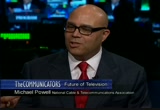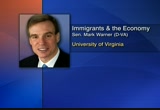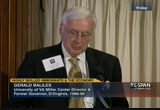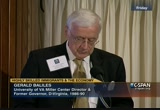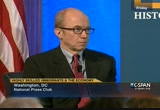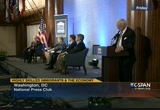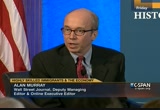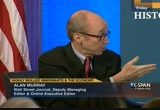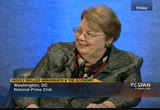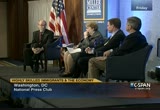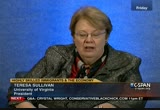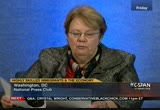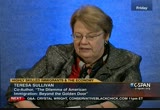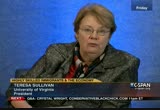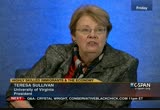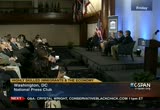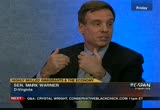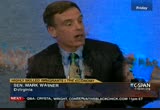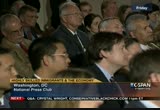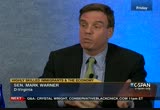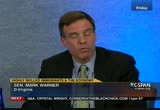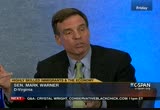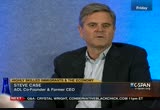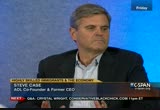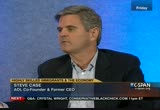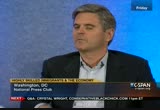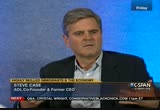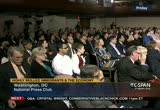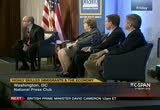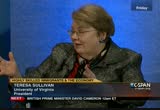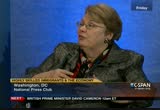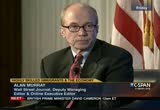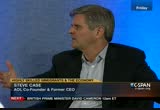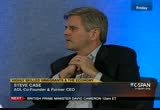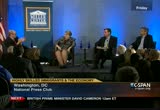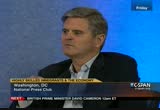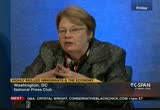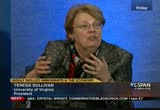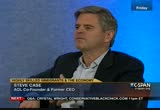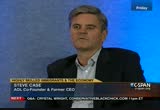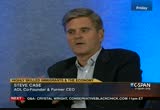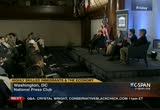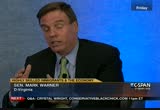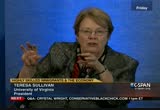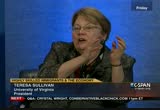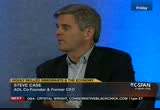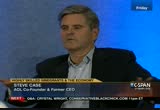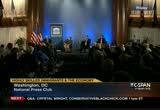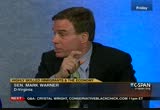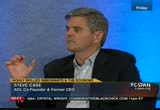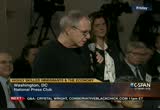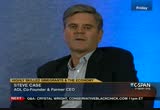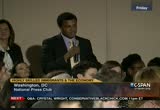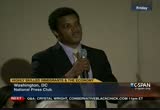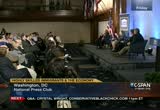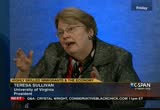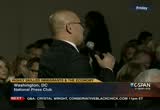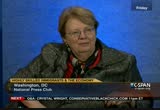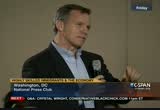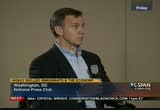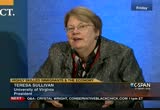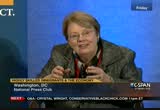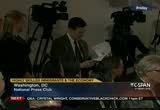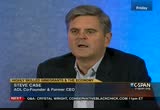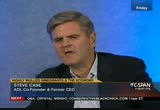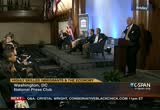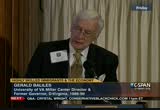tv News Politics and Public Affairs CSPAN December 9, 2012 9:35pm-11:00pm EST
9:35 pm
wright. there is another chance to see david cameron take questions from the house of commons. >> i don't mean just the channel but the able to find surprises. every month or every year i get some show that people are talking about that i don't think you can have imagined choosing. you could not convince me to choose honey boo boo. or a certain food channel networks. i don't think if i had to predetermine that was my preference i would have ever picked them. but the ability to stumble on them, to hear people talk about them and let me go into an environment and suddenly find i
9:36 pm
like honey boo boo and i'm watching its. i think that is a huge part of the experience and i think it is sold short. i still think a lot of americans love the enjoyment of escapism and being able to roam around the tv jungle finding things they did not know were there. >> michael powell on the future of television. on c-span2. now a forum on highly skilled immigrants on the u.s. economy. a panel talks about how immigration laws affects mat scuents. we'll hear from mark warner. hosted by the university of virginia's center this is about
9:37 pm
an hour and 20 minutes. >> thank you, david. good evening. welcome to the national press club for the keynote round tail. i would like to pay special tribute to mark kaplan whose vision has made this annual conference possible. his commitment to public service has been stead fast through the years and we're grateful for his abiding friendship. i also want to recognize, as david has, the hard work of david, mike, jeff, of the center. who is responsible for convening this group of scholars, poice
9:38 pm
makers, and key figures from the private sector. as david highlighted this session i should point out that we examined the full spectrum over high skilled immigration in an effort to refrain current thinking about admission policies or highly skilled foreign born workers. experts provide different perspectives on the suggest and discuss the benefits and limitations of current and proposed policies. simply put, they put deliberations together with some very smart people. the writer famously observed that the thing he disliked about an argument that it interrupts a discussion. our aim is discussion tonight. to pull threads together and to invite your questions and discussion and to focus on some
9:39 pm
of the big issues. to do so we have aseemed a panelist representing three groups. the academy, the government, and the private sector. we will rely on veteran journalist alan murrey to introduce the panelists. he is a long-time friend who recently left his online post as deputy managing editor and executive edit of "the wall street journal" to become president of the research center next month. in his 30-year career at "the wall street journal" he served as numerous roles. during his years as chief he won three pulitzer prices as well as many awards.
9:40 pm
he is also the author of many abooks. "the welt of choices" how the new economy puts power in your hands and money in your pockets." lawmakers and lobbyists which he co-authored with jeffrey. he received an award. he has also received two overseas press club awards for his writings on asia. in addition to serving on the council, he is a member of the gridiron club, the council on foreign relations. he also happened to serve a long time ago at the board of
9:41 pm
visitors not too far away from virginia, the university of north carolina. please join me now in welcoming our moderator, alan murray. >> thank you, governor, for that generous introduction and overlooking the disability of my alma mater. i appreciate it. we've been through the most expensive election campaign in the world. it is over $2 billion that was spent over the course of many months, repeated debates. when it was over we woke up the next morning and discovered nothing much has changed. same guy was in the white house, the same party controled the two parties of congress, same issues, same fights, same stalemate, same dismal of
9:42 pm
getting through the stalemate that we had before the election. i do think there is one issue on the national landscape that has changed and that is immigration. as david pointed out it is not because immigration is a top nick the campaign. the research center polled on this in september and they gave voters 12 issues and said rank these in the order of importance. it was all the onces you would think that are important, taxes, jobs, out of 12 issues immigration came dead last. it was not a topic for discussion in the election. but, of course, what happened on election night was that more than 70% of latinos voted for president obama. and republicans said that maybe marco rubio is right and maybe
9:43 pm
we have a problem. i think it is created the possibility for some movement of comprehensive immigration and legislation that will also deal with this more particular issue that you've been talking about today and we'll be talking about that tonight. i say that to commepped the center to see this months ago and realize this is going to be the issue that everyone would want to talk about after the election. now i think all of you know that in washington introductions is an inverse importance of the person being introduced that's why the governor gave me such a long introduction. i'm going to be briefer here because i think you know these three people very, very well. first of all, there is teresa sullivan who was president and wasn't president and now is president of the university of
9:44 pm
virginia. we're happy about that. senator mark warner who in recent months and years has had the ability to talk to members of the other party about matters of the great interest to the country and has been very involved in the fiscal cliff negotiations and of course he of before he was senator he was a governor. then steve is the co-founder of america online. is a rabid twitter. i feel like i know every detail of your life. and a relentless of entrepreneurship. we're very fortunate to have these three panelistings.
9:45 pm
they get five to seven minutes -- there will be a little time left. five to seven minutes to discuss the topic and we're going have a discussion among us then we will open it up to you and hopefully, we will get to all of your comments and questions. >> i'm delighted to be here this evening because i think the topics is important. this conference also recognizes mark kaplan who is that i am pleased to speak in behalf of tonight. we're looking tonight at immigration policies and how they affect our eighty to attract high-skilled immigrants. engineers and entrepreneurs who contribute to innovation. because universities and colleges are in the talent business.
9:46 pm
we're in a global competition for talent. all yustses, but particularly research university, are competing to get the best and brightest. if immigration policies make it differently for international students to come to the united states then we undercut ourests to be competitive. this issue came to the forefront in a recent report. in 2009, because of concern of the nation's research universities were at risk congress asked the national academy to assess the position of the universities. and they asked to answer the following questions, what is the top 10 actions that research universities, the federal government, and others can take to ensure that the research university can maintain the research needed to help the
9:47 pm
united states compete and achieve goals for vuremal and security in the 21st century. they are a working group of the national academy and they produce products that shape policies. that question posed by congress is pretty complicated and the n.r.c. leaders needed to put together a panel that represents a broadband of leaders, people from government, the academy, and the national laboratories. i had a privilege on being a member of that panel. congress asked for 10 actions we structured our report around 10 recommendation with a time frame in the next five to 10 years. one of those recommendations focused on policies of the flow of skull laars and students to
9:48 pm
the united states. more and more students are applying to come to our research universities. u.v.a. has had a 53% in the last three years alone. the u.s. benefits with talented students come to study and conduct research and we benefit if they can stay in the united states and work after they graduate. it is in our national interest to attract and keep talented people. but in of our current policies are burdensome to students from other countries. and to ensure a larger number of research remain in the country we recommended further that the government streamlines the progress for researchers to
9:49 pm
maintain permanent residentcy on their way to u.s. citizenship. we think the government should consider the strong ep of granting residentcy through a green card to a nonu.s. citizen who earns a doctrine from an creditted research university. there is recent action in congress to address these issues. the house of represents passed a jobs act. it create add new green card program for foreign students in the stem fieldings from a u.s. institution. the senate is not. expected to consider this bill in the lame duck session. harry reid has said that comprehensive immigration reform will be a priority in 2013. ere support for expanding and creating new visa programs for graduates and that is a goal that isporby the higher
9:50 pm
education association. including the ciation of higher universities. i also want to take this opportunity to thank senator warrer in because he has supported this immigration also introducing the starp-up agent. it was introduced in 2013 to create a new stem visa that foreign students who graduate with a masters or hpped can receive a green card or -- p.h.d. and stay in this country. to pass legislation that expands opportunities for our stem graduates. if we don't, our national competitive horizon has just narrowed. >> senator? >> thank you, alan let me thank
9:51 pm
my friends, participants on this panel, the miller center for asking me. let me add my two cents as well on mark kaplan who has been a good friend for a long time. he shows clean living, 96 years olan several years o marriage. i think it is particularly aproper of the miller center to ask me to be here, talk about this topic, since my baurp efforts on fixing the debt and deficit have been so successful. this issue tonight, is tied to debt and dic is important because it is a question of whether our country can stay
9:52 pm
competitive. we all know, we use the terms whether you are a university, or a private enterprise or looking it from a government stand point. how and where we invest and how we choose to invest in public resources to infrastructure, work force training is going to be a determine ant o whether we're going to be successful or not. steve has worked on a great dale, if we look at how -- deal, if we look at how america is going to stay competitive. now that i'm a federal employee when i hear an annoying sound i cheer cha ching. the question of whether or not america is goingo be able to compete, can wkewe going to havf
9:53 pm
innovation that creates jobs and steve will speak to this, literally 80% of new jobs eate in america have come from start-ups. where have the tall lent come from start-ups disproportiotem first generation of americans. we're lucky here in virginia thivals the silicon valley in the number of start-ups. you look a little deeper, a thirof theecfirms in northern virginia have one of their founders a first generation. the mbers in the valley are even higher. how do we maintain that? one is talenand i will come ck to that in a moment. another piece of this, which w think is waactive in and did get passed
9:54 pm
this year is new tools iterms of capital. that is important but we have to broaden that access to capital. we have passed through start-ups 1.0 where jobs and two significant changes, one allowi those companies who are on the path of gog public an easier pathway. second, which could be enormously dynamic and totally transformative the power to use the internet to access capital through crowd funding and crowd sourcing. something that iser powerful and somethinge have worked on together it is in the mdle being regulations passed out of the f.c.c. if you have catal you have have count. i think we have all looked at thnumbers in terms of,
9:55 pm
unfortunately,rica ameborn graduates in theield of science, engineering, and math, if you dig in a little bit more the numbers are stunning. i think champion is at 44% of their graduates are in those fields. europe is at 24%. america is at 167% of your graduates. -- 16% of your graduates. as important as creating the kind of human talent that is needed in these key files that will drive innovation, then you know we're in trouble. i would correct one comment, there has been some of us chris on the democratic side and marco rubio and a senator from kansas we have put forward legislation long before the election that
9:56 pm
said let's look at this tall lent competition issue and put forward an approach that many of us, those of us from the business world that have been talking about for decades. while we recognize we need to do more to prime the pump in terms of science graduates, native born americans particularly but focus on losing the numbers in middle school on girls and minorities. we also have to continue to attract talent from around the world. one of the ways we can can and will is if we change our visa policies. as a matter of fact, if we had visa policies and immigration policies in effect in the 1970's and 1980's that we had now we would not have had the googles, or the intels because many of those founders that graduated
9:57 pm
from the american universities would not be allowed to stay. our bill does a variety of things. but the two most important, one, let's start with the lowest hanging fruit. those graduate degrees masters and p.h.d.'s in science, technology, engineering, and math. and say if you graduate and you have a job awaiting you in america we're going to give you a green card. this should be the most basic of common sense because the remarkable thing these jobs now in a global economy can be anywhere in the world. not only those high-paying, high-skilled jobs themselves but sometimes support jobs. if you are an engineer you can be a computer engineer.
9:58 pm
part two, we get a few less nods on the second which is to advise what i believe policies. those folks lucky enough to stay in this country in many cases become indentured servants to the companies they work for because their ability to switch jobs or, god for bid, decide they want to be entrepreneurs and they are greatly restricted. even if folks study here or work here their ability to start that next a.o.l. is restricted. that kind of loss of talent goes to the heart of our ability to compete. we also create a brand new entrepreneur visa with a lower threshold that currently exists. this will be subject of some debate but $1,000 of raising
9:59 pm
capita so you can hire americans and they can move into entrepreneurs opportunity in this country. these supplementing the great work of our universities. let's help the folks who want to live out the american dream it is the best interest of all of us. i will come back to how we get that done in the conversation going forward. >> steve? >> let's take a step back and put us in some context because sometimes we're dealing with immigration and all kinds of specifics. it gets a little bit wonking. it is important to take a step back and see why it is so important for the future of our nation. i think it is important that the nation once was a start-up. a bunch of pioneering people to come over here on boats and try
10:00 pm
to build a better life. it is also worth mentioning that we did not become the leading economy by accident. it was the work of entrepreneurs creating companies and entire industries that really fueled the it to the point where it is now the leader of the free world. it was these risk-taking pioneers, innovative, entrepreneurs, that helped to build this nation. the pioneers, the patriots, thomas jefferson, there are a lot of different facets of the story of america. one really important one that does not get enough attention is the role of the economy, particularly the role of entrepreneurs, innovation to power the economy. we still remain the world's most entrepreneurial nation. the bad news is that other nations have figured out that
10:01 pm
our secret is the entrepreneurial economy. what they have moved to do at a rather startling pace is to modify their own policies to become far more entrepreneurial around talent, their immigration policies. australia on a per-capita basis as 10 times more visas for high skilled workers than we have in the united states. on capitol, creating investment incentives, no capital gains to make sure that investment capital flows to those countries, investing in basic research in better ways to commercialize research, less regulation, a whole series of things that many nations are doing to become more competitive. this is a global battle for talent and capital and ideas. if we do not move quickly to
10:02 pm
deal with this issue, we are going to lose our lead. we are going to wake up someday and say, what happened? how did we go from being the most entrepreneurial commission, the envy of the world, to slipping? a great example of this -- last month i spoke in detroit -- and realize two things. one was, 50 years ago, detroit was silicon valley. it was the most innovative region in the country, maybe in the world. in the last 50 years, detroit has lost 50% of its population. 50%. henry ford and others, they were building up these companies, which were
10:03 pm
tremendously innovative, and it felt when it lost its way. as a nation, we have to make sure we do not lose our way. this issue of talent is central. any organization is only as good as its people. people say that all the time. it is a truism of management. in the global battle ground these new ideas and companies and industries, winning the talent battle is critical. we win half the battle now. over half of the people coming to our great research universities all around the nation are from other nations. they are coming here to get a great education. the tragedy is once we give them this great education, all too often we kick them out, force them to go back to their countries. they want to stay here in many cases. they are forced to go back. the create companies there to compete with companies here. it is insane. we have to do something about that. let me tell you my frustrations
10:04 pm
with why i do what i do, being an entrepreneur and investor. i have great respect for mark, leaving that role, that messy world of politics. we were talking about a high- school emigration, stapling a green card to ph.d. and masters for at least a decade. i am sick of talking about it. we have to do something about it. if we do not do something about it quickly, we will lose the talent battle. one of the statistics that mark was telling us, 1/3 people starting companies in the virginia area, half are in silicon valley, but it has dropped 10 points in the past decade. we are starting to lose the battle. if we do not move quickly to reverse the trend, that will continue to slip. these people are not just going away.
10:05 pm
they are going to other places to create other companies. as more people go away and those entrepreneurial ecosystems start building up, those nations are going to become more of a magnet for talent, capital, ideas, and the genie will be out of the bottle. it is time to come together in a bipartisan way, had people like senator warner who are willing to work together to forge a consensus on this issue. there are some paths forward. immigration needs to be less of a debate about a problem and more of our recognition of an opportunity that if we are successful in navigating these waters, we will be extremely well positioned as a nation. if we do not, we will be in really bad shape. >> i think is probably obvious by now that this is not a debate. [laughter]
10:06 pm
in the interest of the playing doubles advocate, let me ask a few questions. president sullivan, you talked about a 60% increase in applications to the university of virginia, driven largely by chinese students. what are the appropriate limits on foreign students in a public university, or admitting them into the country? how do you decide what the appropriate and optimal limits art? >> at the undergraduate level, we have a serious obligation to the commonwealth. 70% of our undergraduate students come from commonwealth of virginia. that means anybody who is international, or from one of the countries outside of the united states, they are competing for the other 30%. the undergraduate student body has risen very slowly because we have lots of competition in that pool. particularly in the graduate
10:07 pm
applicant pool for some stem at fields, 85% to 95% of your applicant flow may be international. if you are going to have a full-sized graduate class, you'll have international students. it is particularly true in engineering. engineers with lower levels of a degree qualification are in such high demand in united states, it is hard to get them to hang around to get an advanced degree. a very common experience in the chemistry department -- american students, and, they start to study for a chemistry ph.d., and she finds out that with a master's degree, she can make a very good living. the phd plan is abandoned, and instead, the master's candidate goes to industry. that happens over and over again. foreign students come here, they will stay all the way through
10:08 pm
the ph.d. program -- they cannot get that job. they want to complete the reason they can the united states. we have a high completion rate among foreign graduate students and relatively low completion rate among american students. it is not that american students cannot do the work. it is that they have intervening opportunity which four students do not have. >> senator warner, you made a reference to the failure of the education system to produce more stem students. shouldn't the focus be on fixing that rather than bringing in people from overseas? >> you have to do both. there is a short-term problem and a long-term problem. i would also add, we do, what, 30% of undergraduate students in virginia, it helps with
10:09 pm
enormous diversity, it helps with national ranking. it helps to subsidize the cost of the free conscience money. when we were governors, we put more money towards our state university system. this is a problem that has been growing. i remember in the 1990's, i was chair of the math and a side collision in virginia. at that point, literally, 45% of our middle school math and science teachers were not qualified to teach math and science. even at that point, you could go out and get a better job than being a teacher teaching math and science. what we have is a longer-term problem, i say this as a proud father of three daughters, all
10:10 pm
three of which are about in the. middle school, they're losing their interest in math and science. you look at the same trend in terms of children of color. there are a series of issues from that and science and not being taught in the most innovative and interesting ways. i think it goes to what kind of role models there are. not having the corporate support system. it is not a new problem. data is quite frankly getting worse going forward. that does that question, yes, we need to reform our education system, particularly focus on middle school years, but we also have to recognize, as steve mentioned, one of the opportunities and challenges of the internet is that that has made space and distance and time disappear in terms of the
10:11 pm
exchange and flow of information. you can build it anywhere. if you can build it anywhere, that means america's international companies put footprints everywhere, and they can choose the microsoft's and googles, where to locate. if they do not enough talent, they will relocate. they are being trained at our universities. oftentimes the case is that they're not going back home. they're just driving north to toronto and looking at places like canada where there is much easier immigration. >> there are people that say that the problem is not that you cannot get the talent in the united states, but that it costs more and that this is about a less expensive alternative. >> no, i do not think that is true. i think it is also worth putting
10:12 pm
this debate around high skilled workers, particularly stem graduates and advanced degrees, in a broader context. the legislation that senator warner introduced, the startup act, and basically created a stem visa. we had 300 million people in this country. the issue of immigration and more broadly that is hotly debated, and hopefully there'll be some resolution sooner or later, about 11 million undocumented people in this country. the dream act would affect about 1 million people or about 1.5 million people. the data suggests that they are job makers instead of job takers, in terms of what they directly duke and the companies they create. they've ripple into the communities. it was not just that aol was
10:13 pm
recruiting people, but we were creating jobs for people. from construction to restaurants -- it was a broader ripple effect in the community. it requires people to take that idea, start with three or four people, then 300 or 400, and one recent example that shows the importance of immigrants and the connection with immigrants and entrepreneurialism -- i should mention that almost half of the fortune 500 companies were started by a first generation americans. i'd be known how we lost the manufacturing system. seven years ago, there was a bankrupt factory in upstate new york. an immigrant bought it. he said i will figure out some
10:14 pm
way to use it. seven years later, he created a company that has hired 1500 employees and will do $1 billion of sales. it is the number one yogurt brand. seven years ago, it was a bankrupt factory in upstate new york. the impact more broadly is pretty significant. >> you talk about how countries around the world are trying to copy that secret sauce of america's innovative society. do any of you see any indication that the united states' appeal, from its great research universities or to people who want to start companies, that
10:15 pm
the united states has lost any of this appeal? >> absolutely. the university may be different, but as it relates to the entrepreneur ship and creating companies, absolutely. that is not to say that we do not have a lot of things going for us. to suggest that there is not robust entrepreneurial ecosystem developing in many different countries is just not accurate. one fact that should be scary is that there is a venture firm, xcel partners, that back facebook -- all of their venture investors were silicon valley. now they have more venture investors in china than they do in silicon valley 10 years later. why did they do that? they believed the opportunities
10:16 pm
there are significant. they think there are more opportunities there than there are here. >> i would say that there have been other countries that have expanded their opportunities. there was not much chance to go back home 25, 30 years ago. we have and flattening the globe. it happens. there is a free flow of capital and ideas. i still would not try our position for anywhere else in the world. we still have a stronger university base. we still have with our challenges more access to capital than anywhere else in the world. we have an entrepreneurial system, even though some complain about the level of regulation, it is still robust. not every idea we originally
10:17 pm
thought of in america. we used to have such an enormous advantage in every field that we had the ability to look inward and think our ideas were always the best and not worry about competition. now we have to worry about the competition. i think we will step up to it. i think part of this is around this immigration issue to make sure we continue to revitalize ourselves, which is what immigration is about. this is not the first time we have grappled with immigration. >> president sullivan, how about universities? >> cannot think american universities will be in the situation at detroit found itself in years ago. we have serious competition now. other countries are investing quickly in their universities and a lot of money.
10:18 pm
in china, at the same time we are not investing in public education, they are investing heavily. if you walk through chinese university, you'll see an amazing, huge, brand new laboratory buildings. they do not have people in them yet. they do not have the human capital. they put the physical capital in place. the day is coming when those new ph.d.s that are graduating, even all they could stay in the united states, there will be a job in china instead. the day is going to come when we are facing serious competition. europe is not being sanguine about this either. the european research universities are working hard, looking for ways in research areas where they can come together and they can have a synergy in which the whole is greater than the sum of its parts. that overlooks the national
10:19 pm
boundaries and finding ways to overcome the national boundaries. >> let me add one other point. >> the senator rules, am i right? [laughter] >> this comes back to my obsession with the debt and deficit. one of the challenges is that any great business that invests in their work force does best. we have cut back on our public investments. the plan passed by the house of representatives would cut federal spending on all domestic items around education, infrastructure, and a workforce turning to less than 5% of our total public spending. we can argue about the politics of that. that is not a business plan anybody would invest in if you are going to compete.
10:20 pm
>> one other point that is worth pointing out, if right now our universities were 100% people that were born or raised in america, 0% of people from other countries, and somebody proposed opening up the world, and said, let's have a target that someday half of the students getting these advanced degrees should be from other countries, the proposal would have been like the military service proposal. you have an obligation to serve as the country. if we are going to get educations, then nobody would say, let's take half of those slots, given to people of other countries, give them educations, and then we'll take them out to compete with us? no. that is what we have put in place. i do not propose that we require people to stay and serve, but we should make it easier. >> before i go to the audience,
10:21 pm
i want the three of you to take out your crystal balls and tell us, the next 12 months, what is going to happen on this issue, steve? >> i am optimistic. i am cautiously optimistic. it goes back to what the senator says. the startup bill passed with broad bipartisan support in congress. they came together on that legislation because it was important for entrepreneurs to get extra capital. even though it was election year, something did get done. it is because people recognize it was important. the good news is that people
10:22 pm
recognize that the issue is important. there is a general agreement on the solution around high skilled immigration. the problem is the politics of entrepreneurship and innovation and the economy and jobs. this has all been trumped by the politics of immigration. there are four paths, and one was the stem jobs act. it will not be taken up in the senate. there is a diversity lottery, it would result in raising the overall level of emigration. if there was agreement to include that, potentially, that bill could be passed. i do not think that is likely to happen. the second option is what the president has indicated -- to link high skilled immigration and the provision of the startup act to the dream act. it is a broader solution around emigration. the third would be to say -- this just deals with the 50,000 -- the third would be to say
10:23 pm
let's deal with comprehensive immigration reform. the 11 million people, which we have to deal with clearly, and there is a desire more than there was a month ago to do that. even president george w. bush talked about taking up the issue and he called for a comprehensive solution. that is the third. the fourth path would be to say that this immigration pass is challenging and to build support for senator warner's bill. it would link immigration to regulatory issues, commercialization of research -- if i had to bet, i think something will happen this year. i think it will be something, either number two or number three. it will link to the dream act or republican version, the chief act. or perhaps it is comprehensive
10:24 pm
immigration reform. i do worry, even though that is a problem that we have to sell, that it gets pretty complicated, and the more complicated it gets, i am sure it is harder to get down. any one of those four paths would be possible. i am optimistic. >> i am optimistic too. i think there is an 80% chance that we are not going over the fiscal cliff. [laughter] i cannot think there is any chance if you look back at the history the immigration lottery system, which you will find an awful lot of those american entrepreneurs, they came through that program, and this notion that there will be a trade-off, it is like pre- election. that was the political reality then, but not now.
10:25 pm
the change on election day was these items like startup 2.0 were challenging to get republican colleagues to come along. now everybody supports that. it was the starting point. the dream act, which i think it was an embarrassment that we do not pass that already, as somebody who lives in a commonwealth where i see many kids who grow up in virginia, went to virginia schools, parents have paid taxes for years, and in the process of trying to continue their american experience -- we luckily were able to overturn tried to exclude those from going to college. that i think becomes now trading at a given but it sure as heck could be done fairly
10:26 pm
shortly. the challenge is now going to be, because there are these 11 million undocumented persons, who overwhelmingly work in america, try to sort through some at the legal status. i think that has got to be a national priority. the items of what could have passed before -- there has been a seismic shift. i think rightfully so. people say that we need to do more. not just deal with high skilled, not even just deal with those kids who have lived here for years, who came here with no choice of their own, give them the path to serve in the military or get an education. >> better than a 50% chance that you get a comprehensive solution? >> i hope so. i think there are some rightfully say, it will be the subject of a lot of debate and discussion. we will need the scholars and the folks in the audience to
10:27 pm
help us think for this. do you take this through a series of legislation pieces? do you do it through a comprehensive measure? those of the questions going forward. >> i think it is hard to take an issue on which a lot of people agree and get a lot of action on it unless there is trust that a lot of the other issues that may have less consensus -- have trust that those issues will also get addressed. that is one of the reasons why comprehensive immigration reform has been attractive to ensure that all of these issues get addressed at once. or, it is a reason that the senator's bill is attractive because it sees immigration in the context of other innovation issues. i want to pose another way that you could do the highly educated immigrant as part of the larger issue. that is -- [indiscernible] what i see happening in many of the states, it is completely
10:28 pm
renewed interest and why american students are not doing as well in the stem fields as you might expect. while we do not have our graduate schools full of applicants coming to american schools, instead of foreign applicants. i would not want immigration reform to become a substitute for our continuing to focus on our own problem of getting american students excited and interested in science and engineering. if we could cut the attrition rate of the freshmen who began in science and engineering, if we can cut that by 25%, we could meet many of our needs in the united states for stem workers. i think it is important that we have to trust that if we do address the high skilled immigration issue, we do not do that as a substitute for looking at all these other issues that still need work.
10:29 pm
my question -- your question ends up being, can you trust that congress will do something? the track record is not too good. >> one thing i want to say in response to senator warner to i agree with almost all the time, i want to push back on one issue. he said the election was a seismic shift. i think it is important that both sides do not overplay their hands. i certainly understand the position of the democratic side is that president obama won election, by a pretty significant electoral margin, and also if you look at the data, the reason for that predominantly was the latino vote. indeed, i saw one statistic that if mitt romney had gotten the same percentage of the latino vote that george w. bush got, he probably would have a won. that is the case. you have to get it right with
10:30 pm
this demographic shift. republicans have to move quickly to compromise. democrats basically can hold our line and say, our way or the highway. i have heard that view. i have heard that much. there's another view on the republican side of what you hear is the president did but 48 percent did not support him. the house is still in control of the republicans and most of them, fortunately because of redistricting, which is unfortunate dynamic, most people in the house are in safe districts and will actually be punished in many cases if they moved together and compromise. so there is a recognition and there needs -- something needs to happen but it will require some genuine goodwill, trust, negotiations on both sides to come together for common solution. both kind of basically are
10:31 pm
saying, well that's all fine. they have to compromise and these guys are saying over my dead body. we're not going to raise the overall level of immigration or we're not going to deal with -- not going to create amnesty and some of the things that you hear. i think you will see a stalemate. it will require find something common ground and having more people like senator warner, who are working together, celebrate the word compromise as opposed to think that's somehow a negative. >> just -- i should actually let you since you said that at the end, i should just go on. two quick things, i think there's a much more alignment, the business community has been for comprehensive immigration reform for a long time. perhaps not as forcefully as i wish they would have been but there's no doubt there's scaled immigration issue and having a ration guest worker program that works in certain industries. but part around conference and immigration reform that might be a subject of future discussion
10:32 pm
is don't think we will get comprehensive immigration reform until we have -- and this is a challenging issue, a thoughtful question about identity validation. and that pushes issues not only around immigration but homeland security. it pushes issues around electronic medical records. and the sooner we get thoughtful about that, so that after immigration reform, there is a way that we still have a right to enforce our borders and have employer and employee ability to check the legal statous of somebody who isn't working, that will push ub into uncomfortable situations for all across the political alley. >> questions, comments. please wait for the microphone and identify yourself before you ask your question. >> hi, anymore name is lawrence. i go to georgetown university. thank you for taking the time to
10:33 pm
speak with us today. my question is, given the issue of outsourcing, what impact do you think it has and what impact do you think it should have on immigration policy and vice versa? >> i think that a lot of the original outsourcing was not driven by immigration poll by but costs and labor. one of the hidden stories that have not been as reported is those differentials have come down and america is much more competitive then it was even a decade ago. low and mid-skill immigration, low and mid-skill tech jobs. one of the challenges though with our current policies as company who have global footprints, if they can't hire that high-skilled immigration that comes out of a american university here but they can hire him in indiana or china because they returned to india
10:34 pm
or china, they may do so and it is tied into this high school immigration discussion. >> and i add technology has created robotics, other things, more advanced factories and that has involved job creativity and a negative. but slight positive, what senator warner is alluding to, we have seen a trend, not dr. matek but a little trend. we saw apple say they would make one of their products in the united states. probably political calculation or two but related to the economics underlying this, which is you need fewer people to make the stuff, then the cost differential to make it here versus make it there diminishes and argument then becomes more maybe we can. number one. number two, there's a whole initiative called advisory council entrepreneurship and one of the areas of focus has been dance manufacturing and what's
10:35 pm
called additive manufacturing. some call it 3-d printing and things like that. which is really an interesting area. still early days but over the next decade has the potential to have much more personalized approaches, more custom approaches to manufacturing which result to more things being made here as opposed to other places. it is a concern but people are more optimistic now then five years ago because some of this technology is dancing, which people views inexotherably as a negative because it was hallowing out the workforce is actually in some sectors a little bit of a positive. >> over here. yes. >> hi, my name is pat. i'm a report we are computer world. thank you for this excellent panel. fy question is to senator warner. it's about the h1bb. you mentioned a couple things you would like changed with the visa. the question i have for you, this remains a sr.ous point of contention with a lot of information technology workers
10:36 pm
who have -- are under continual pressure on their jobs. a lot of jobs have been moved overseas and those job losses had been directly facilitated by the h1b visa. how are you going to address that in comprehensive reform? seek to limit the cap, raise the cap? what kind of things can you put in a comprehensive reform that will actually help and protect some i.t. workers here from having their jobs going overseas? >> well, a couple of points. one, we've talked about a stem, a graduate stem visa, one category over here. that really is at those very, very kinds of high-knowledge level job that's we again, i think most folks would acknowledge, we're not producing enough of our own. the h1b, current regulation is sort of silent on the totals and
10:37 pm
i think that you raise a valid point but it's part of what i believe about being able to drive i. tirks jobs back into america. one of the things i think we have done a fairly dreadful job on is finding those, not programming but mid-tech jobs that could be very easily located in rural america. you know, where the most pushback against -- against some of the immigration changes and about the transformative change brought around by information age is rural america that has said, we can build it anywhere but we've not done a good job building it in martinsville, virginia. we need to do more of that when connectivity is a piece of that but i think there's a chance here around mid-tech jobs that are attracting. i do think on the final category what i have talked about is entrepreneur visa that it would be, it literally spin-off from the h 1b that said that
10:38 pm
individual captive to that company, that the path to legal status in america separate would be the ability to raise independent capital and hire additional americans. so in and of itself, that would be by definition a job creator and job creator of americans. >> question right here. >> tom mansback from virginia beach. i think that probably most important point made tonight was by president sullivan, who talked about timing. we have been very successful in talking to various developing countries that they need to open up their markets for individual entrepreneurialism and we see a lot of people going back to india now because we have been somewhat successful opening up there, opening up their markets there.
10:39 pm
the other issue is china. we need to keep the chinese people here because when they go back, they will compete with us. timing, i think, is everything and we need to get this going and we need to get it now. and there is perhaps an important point in dividing visa issue from the general immigration issue. because one can be dealt with i think much more quickly. then the other one can. >> any comments on that? >> that's actually been my view for some time. because of the urgency around entrepreneurship and innovation, moving quickly to deal with high school immigration is the right way to go and very supportive of senator warner and cubio and mow ranio starting it back 2.0. if there was a consensus in the congress, and with the white house move on that, i would be delighted. my own assessment at this point is that that's unlikely. that i think unless there is a
10:40 pm
broader solution around immigration t. doesn't have to be everything, which is why it might be sort of start back plus maybe it could be comprehensive. my guess is that it doesn't -- reading tea leaves, this is not like my day job is investing company, living in social and zip cars, like kibitsing and moonlighting on the sidelines. people up here know a lot more than i do. my sense just talking to people and kind doff it in kind of bipartisan kind of way is that it probably is at this point to get traction on the high school issue, there probably needs to be a broader discussion of immigration. >> close to right up here, up front. ok, we will do that and then right here and then a question right over here. >> hi, my name is -- am i up? all right. my name is tendi. i'm an immigrant. i'm from zimbabwe. i have been here about 13 years.
10:41 pm
i think -- yes, i'm still trying to get a green card. still on a visa. but i guess my question really is, you know, like file like we're at a choir practice, right. so everybody has agreed. we are singing the same hymn and talking about the pitch of the hymn. and i feel that the immigrant of the brand is kind of bad brand in the united states. my question is how do we change the brand of immigrant and make it it more positive because i think that will enable legislation that will kind of get all of these thing that's we're talking about to get done. i have been here 13 years. i never had anybody say to me anything negative personally about being an immigrant but i know the immigrant brand is not to positive in the united states. how do we change that image of immigrants and, you know, let the american people know that immigrants are making a lot of
10:42 pm
contributions. i think somebody mentioned chobani, the yogurt, which i think hi some this morning. i had no idea -- i had no idea it was an immigrant company. >> you thought it was from greece. [laughter] >> exactly, you know. i had no idea. these google -- all of these companies which maybe it needs to be a marketing campaign. i don't know. but something i think should be done to change the image of immigrants and make it more positive, and i think that will facilitate everything we're talking about today. so how do you guys think we can maybe change that image of immigrants and make it more positive and not make everybody, when they think of immigrants think of border wars on history channel. >> well, at different times and places, immigrants have been viewed more or less favorably in the united states. this is a nation of immigrants. but when immigration was largely
10:43 pm
cut off during the 1920's, a lot of americans became somewhat estranged from the immigrant roots of their forebearers. and lost a sense that we were a nation of immigrants. but in some parts of the country today you see the enormous economic vitality it comes with a really diverse and active population that attracts immigrants and kind of zestful necessary they add to a community like those in northern virginia. or southern california or texas, where i spent most of my adult life. so i'm not sure it's true everybody has a negative attachment to immigration. but on the other hand i think the political controversy about imgrace, which would have been about undocumented immigrants, has perhaps led people to somewhat negative cast to immigration. i can tell you that the united states as well as europe and, you know, many other countries including eventually china, because of our current demographic situation, we will
10:44 pm
turn to immigration increasingly because our fertility is approaching or below replacement level. and so immigration will be a necessity. you see this already in europe. the chinese are already beginning to think about the fact they're one-shot policy will lead to them having a much older population soon with many fewer children. so immigration then becomes, you know, another way that they can continue the economic vitality of their country. so to me immigration and vitality are closely linked. i think that's true for many business people in the united states. i think truse for many people in the universities. not too sure about politicians. >> reminding people that -- at the beginning of the story of america is story of entrepreneurship and the story of entrepreneurship is the story of immigration. some of the iconic nation, at&t were founded by immigrants. not recent tech phenomenon, history for a long period of
10:45 pm
time. i believe the reason is so controversial problem and so sensitive and emotional is the debate around immigration really is a debate around illegal immigration and there needs to be more focus on legal immigration and thinking less about the problem and more about the opportunity, less about a political problem if you will, more about an economic opportunity. reframing it as winning global battle for talent to make sure we and the people here not just companies but next industries that are going to drive the next century. >> there's a question right here and then here and then in the back. >> jeff lee. i'm actually, i'm an immigrant and naturalized citizen and started my own company and big fan of president sullivan. my question is that, we talk about immigration coming here, but one of the questions i want to ask the panel is about the unknown immigration that's going the other way.
10:46 pm
with the immigration policy set up, we have many universities setting up outposts basically sort of taking the town pool of our professors and towns leaders and spreading it throughout. since mohammed can come to mohammed, the mountain goes to mohammed, right? and also the whole notion that in china and india where there's a tremendous amount of university research parks being bit and created, terry you talked about the labs that are built and ready to go. it's worse then that, isn't it? they're offering super star professors double the salary, everything they want plus if you're in the medical field any type of clinical testing want to do to make sure your elements get going because they have different laws then we do. my question is if there's a technology drain, it's also in terms of u.s. laws, we only
10:47 pm
prohibit certain type of technology drains. that has to do with national security and technology. but when you talk about in steve's case the talent of the innovative things that basically get sucked out along with that, that's something going sort of -- nobody talks about that. >> it's true. what you're saying is true. goes back to what you were saying before. other countries are stepping up efforts to be a magnet for talent and some of that is entrepreneur and professor and some of that researchers new york city question about that. so we just have to recognize that's happening and make sure we're competitive. now, my on view of it is, if people want to come here and get an education and go back to a country, fine. actually there is a way to help build a sense of innovation and entrepreneurship, stronger economies in other parts of the world that's part of our state department policieses. whole initiative around
10:48 pm
encouraging entrepreneurship in the middle east. having people come here gone back and start companies there, that's fine. but we should at least give them the option of staying here. if you want to go back, fine. don't force them to go back. encourage them to stay here because we use as many smart people as we can here. working on new technologies and new energies to have a robust economy. we're not going to grow more than 2%, which is current growth rate unless we innovate more. that will require entrepreneurs. we will not get unemployment down significantly below 8% unless we innovate more. as mark said at the beginning, almost all of the net jobs in the last 30 years have been created by young, high-growth companies so this is the place to focus. >> right here. second row. >> thank you. my name is ed bell from alexandria. i'm proud father of a fourth year at president sullivan's fine institution. the topic i have on my mind is at an intersection of the areas
10:49 pm
of interest of our fine panelists and that is online education. keck tivety, -- connectivity, internet, greater trend towards access education, making the great institutions that we have in this country available to people throughout our country and throughout the world either inexpensively or in many cases for free. and this creates in some sense a competitive landscape force across the world where we're actually educating our competitors without requiring them to come to our country and then i have two questions related to that. is that a concern that should be factored into the discussion around online education? and, two, if we are creating competitors across the world, do
10:50 pm
we look at -- at ideas like steve suggested in terms of encouraging people we educate here to stay here, extend that to say people are educating across the world encourage them to come here so that we're not creating competitors that we then have to deal with ourselves? >> i think one area there that people have been interested in are the so-called mukes, massively open online courses. university of virginia will be offering five of those last month. last i checked we had 127,000 people registered for them. and most of those people are outside of the united states. on the other hand other people who won't be getting a transcript and won't be getting credit, they will be exposed to the knowledge. one of the reasons we're interested in this is because our faculty want to learn to teach in this way and we believe students learn differently in this way. from that perspective it doesn't
10:51 pm
really matter so much whether the student is inside of the out or outside of the united states. we're interested in what the educational interactions are. but you make the interesting point that we give away the information. i think that, that is true and i think it will offer a lot of people the opportunity to learn, i could do college level work and this is really interesting, more interesting then i thought. i hope one outcome will be that people who might not have thought of college education will think about seeking one. i can tell from you my perspective of a president of a school that has an excellent undergraduate experience, which i hope your fourth year agrees with, we think that that education is much more than sitting in front of your computer screen and doing the course online. we think the education is much more than that and that's what justifies you moving to a place where you are together 24/7 with other students and with faculty members. not only inside the class but
10:52 pm
outside the class but there's much more going on in the educational experience then just transmission of knowledge. >> if you do it from shanghai, you would at least have to plaster your apartment with pictures of thomas jefferson to get the full experience. last question is way in the back. >> stanley cook, u.v.a. alum in any event with the u.s. environmental protection agency and i'm a strong supporter of the university and miller center. so in a way i hate to bring up this point. there is some dissent out there -- and i say cite two sources. one not exactly a bastion of conservative open borders "the washington post," and i particularly direct this comment to steve and suggest maybe he tute have some conversation with "the post." on the 7th of july it but out a
10:53 pm
major article and this was the headline. i will do a short quote from it. "u.s. pushes for more scientists but the jobs aren't there." i will give you a quote in a moment. i did take the opportunity since my agency has a few scientists to interview them about this. i said what is your opinion? not all but the consensus overall, why are we here? we are here because the jobs aren't in the private realm. a second source was organized labor that i recently went to in view of this form. and public relations person said we agree with "the washington post." i will leave you with a quote and i invite steve to approach
10:54 pm
"the post." there have been many predictions of science labor shortages and robust jobs said jim austin, editor of the online magazine p. science careers. and yet it seems awfully hard for people to find a job. anyone who goes into science expecting employers to clamor for their services will be deeply disappointed. steve? >> well, i do talk to "the washington post." they don't always necessarily listen, but i -- i don't recall seeing that particular article but i make a couple points. first of all, there are a ton of jobs. one of the thing you talk to most countries their desperate looking for skilled workers and degrees in engineering, there's a problem there in almost every industry and ultimately it comes
10:55 pm
down to entrepreneurship starts. i think it's worth noting people talk about business and private sector like it's like one thing. it's not. there's a small business sector in a restaurant and a lot of job that's are created by that sector. there's a big business sector, for chin 500 companies. a lot of jobs there. but growth in jobs and leverage in terms of innovation are young entrepreneurial growth companies and they do required skilled workers. back one company not too far away living social, started four years ago four people. now 4,000 people four years later and their challenge is hiring smart people to handle it. last point i make, people focus on technology like it's sort of an isolated industry and that's why silicone valley becomes almost a proxy for it. almost every company now is a technology company. walmart retail company are heavy users of technology. mcdonald, heavy user of
10:56 pm
technology. underarmor, heavy user of technology. technology is, engineers not just for technology companies, we need engineers for every company because every company in every sector has to be more innovative and engineering is a key skill set and their biggest challenge is attracting enough talent while other people, both entrepreneurs trying to disrupt the large company as well as other nations trying to disrupt us are stepping up their game. >> so this has to be a compelling topic, otherwise you wouldn't have this large a crowd sitting here wrapped on :30 on a friday night. either that our have no other alternatives. we will give the final word to our host, governor bee lyles. >> thank you, alan. i want to thank our distinguished panel and moderator and to thank all of you for attending this very robust, rich and engaging
10:57 pm
discussion tonight about the politics, economics and the legal ramifications of how skilled immigration. in his first post election news conference, president obama stated that he was, quote, a believer. if you have got a ph.d. in physics or computer science who wants to stay here and start a business here, we shouldn't make it harder for you to stay here. we should try to encourage you to contribute to this society, end of quote. it is our hope that with the endorsement of both parties, policymakers in the united states will take steps to enact substantive reforms to help make this possible in the years ahead. for our part, at the millicenter in the coming weeks we will work with leading academic journals in the field to publish the papers from today's conference sessions. please be on the lookout for more information about this
10:58 pm
publication on our website, millercenter.org. where you will also find audio and video of this conference. and on that website, i might add as a mat are of personal privilege, you will find out just how focused and wide ranging our nonpartisan work is on the subjects of the presidency, political history and policy issues of importance to the governance of this country. on behalf of the millicenter -- miller center and university of virginia, thank you very much for being here tonight. we are adjourned. [applause]
10:59 pm
>> tomorrow, a discussion on the latino vo impact on the 2012 presidential election. it's hosted by immigration works u.s.a., a coalition that promotes changes to u.s. immigration laws. it's live 9:00 a.m. eastern on c-span2. next, "q&a" with crystal wright, publisher of internet blog conservative chick.com. and british prime minister david cameron takes questions from members of the house of commons. after that look of the status of the so-called fiscal cliff negotiations between congress and the white house. >>
143 Views
IN COLLECTIONS
CSPAN Television Archive
Television Archive  Television Archive News Search Service
Television Archive News Search Service 
Uploaded by TV Archive on

 Live Music Archive
Live Music Archive Librivox Free Audio
Librivox Free Audio Metropolitan Museum
Metropolitan Museum Cleveland Museum of Art
Cleveland Museum of Art Internet Arcade
Internet Arcade Console Living Room
Console Living Room Books to Borrow
Books to Borrow Open Library
Open Library TV News
TV News Understanding 9/11
Understanding 9/11
